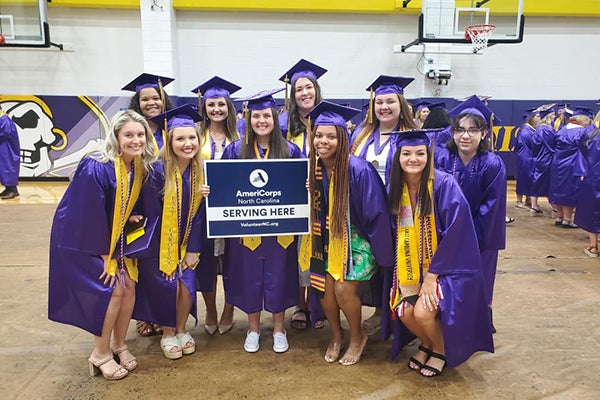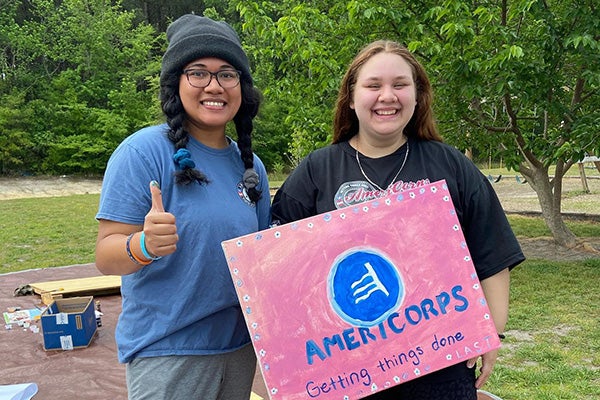Grant expands ECU’s AmeriCorps program to teaching, counseling students
A $3.9 million grant will help youth and families in eastern North Carolina receive access to teaching and mental health support through East Carolina University’s branch of AmeriCorps.
Sponsored by the N.C. Commission on Volunteerism and Community Service, ECU’s Collaborative Action in Rural Education (CARE) Corps consists of three branches to support eastern North Carolina residents: resiliency, teaching and counseling.

Members of the first CARE Corps teaching cohort graduated in May after completing a year of service in Pitt, Greene and Lenoir counties. (Contributed photos)
Nichelle Shuck, CARE Corps director, leads the program, which is housed in the College of Education’s Rural Education Institute.
ECU has retained AmeriCorps funding since 2001 and has previously focused on tutoring and mentoring programs. With CARE Corps, members are also able to serve communities through teaching and counseling.
“I chose to be a part of CARE Corps to support rural schools with the advice and expertise of the Rural Education Institute and the support from the network of people involved,” said Sophie Adgate, special education and Hispanic studies major. “I have already learned a lot about concepts related to service, and I can’t wait to be in the classroom to learn what this service looks like in context.”
CARE Corps is in its second year of funding and provided more than $500,000 in annual living allowances and education awards to future teachers, counselors and tutors for the 2023-24 academic year. All members are required to meet a minimum number of service hours, depending on what branch of CARE Corps they are in.
Resiliency members provide tutoring support with a commitment of 300-450 hours, teaching members support classroom teachers and students for 900 hours and counseling members spend 1,700 hours serving as mental health clinicians and counselors in training for specific high-need areas in Greene, Lenoir and Pitt counties.
Former CARE Corps member and ECU alumna Nicole Silva immersed herself in the community at West Greene Elementary School in Snow Hill during her year of service. Through the connections she made, she secured a position as a second-grade teacher after graduating in May with her degree in elementary education.

“Nichelle was one of my biggest supporters and is the one who really encouraged me to be a part of the CARE Corps experience, and I’m happy she did,” Silva said. “I really learned a lot about rural communities and how to serve the schools in these communities.”
Current CARE Corps members understand the importance of giving back to local communities. Gracie Reavis, an elementary education major, hopes to establish relationships with students and teachers at Elmhurst Elementary in Greenville.
“Growing up in a rural town myself, community played a big part in who I am,” she said. “I knew that I wanted to become a part of the community here in Pitt County and I am willing to serve others.”
While the grant is meant to support students and families in eastern North Carolina, CARE Corps members also benefit from the experience.
“I think that service is an opportunity to work alongside those in a community to make it a better place,” said Molly Baile, elementary education major. “In my opinion, there is no better way to do that than to use my gifts and passions to be a part of the impact in a rural community. I hope to accomplish a sense of relationship with those that I serve and serve with to build a community that uplifts those in it and emboldens them to leave a legacy of their own.”